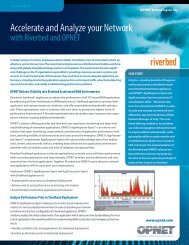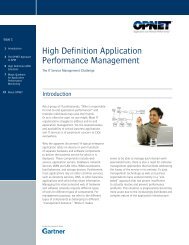You also want an ePaper? Increase the reach of your titles
YUMPU automatically turns print PDFs into web optimized ePapers that Google loves.
common carrier, usually FOB shipping point based on standard<br />
agreement terms. Software licenses may also be delivered<br />
electronically to end users. Electronic delivery is deemed to occur<br />
after end users have been provided with access codes that<br />
allow them to take immediate possession of the software. If a<br />
software arrangement includes undelivered software products<br />
or services that are essential to the functionality of delivered<br />
software products, delivery is not considered to have occurred<br />
until these software products or services are delivered.<br />
• The fee is fixed or determinable. It is our policy to not provide<br />
customers the right to any adjustments or refund of any portion<br />
of their license fees paid, acceptance provisions, cancellation<br />
privileges, or rights of return. Our normal payment terms for<br />
our software products and services currently range from net<br />
30 days to net 90 days and primarily vary based on the country<br />
in which an agreement is executed. Payments that extend<br />
beyond our normal payment terms from the contract date but<br />
that are due within six months are generally deemed to be fixed<br />
or determinable based on our successful collection history on<br />
such arrangements, and thereby satisfy the required criteria<br />
for revenue recognition. Arrangements with payment terms<br />
extending beyond six months are considered not to be fixed or<br />
determinable, and revenue from such arrangements is recognized<br />
as payments become due and payable.<br />
• Collectibility is probable. Collectibility is assessed on a customer-by-customer<br />
basis. We typically sell to customers for whom<br />
there is a history of successful collection. New customers are<br />
subject to a credit review process that evaluates the customer’s<br />
ability to pay. If we determine from the outset of an arrangement<br />
that collectibility is not probable, revenue is recognized as<br />
cash is collected.<br />
In instances when any of the four criteria are not met, we defer<br />
recognition of product revenue until the criteria are met. When<br />
the sale of the software product requires us to make significant<br />
enhancements, customization or modifications to the software that<br />
are essential to its functionality, product revenue and consulting<br />
fees are recognized using contract accounting under ASC 605-35,<br />
Revenue Recognition – Construction-Type and Production. We estimate<br />
the percentage-of-completion, under ASC 605-35, based on<br />
our estimate of total hours to complete the project as a percentage<br />
of total hours incurred and the estimated hours to complete.<br />
The process of estimation inherent in the application of the percentage-of-completion<br />
method of accounting for revenue is subject<br />
to judgments and uncertainties and may affect the amounts of<br />
product revenue and professional services revenue under certain<br />
contracts and related expenses reported in our consolidated financial<br />
statements. A number of internal and external factors can affect<br />
our estimates to complete client engagements, including skill level<br />
OPNET Technologies, Inc. <strong>2011</strong> <strong>Annual</strong> <strong>Report</strong><br />
13<br />
and experience of project managers, staff assigned to engagements<br />
and continuity and attrition level of professional services staff.<br />
Changes in the estimated stage of completion of a particular project<br />
could create variability in our revenue and results of operations if we<br />
are required to increase or decrease previously recognized revenue<br />
related to a particular project or if we expect to incur a loss on the<br />
project.<br />
All fees billed to clients for shipping and handling are classified as<br />
product revenue. All costs associated with shipping and handling<br />
are classified as cost of product revenue.<br />
Product Updates, Technical Support and Services Revenue<br />
Product updates, technical support and services revenue represents<br />
fees associated with the sale of product updates, training,<br />
and technical support, all except technical support provided on a<br />
when-and-if-available basis under our maintenance agreement.<br />
Payments for product updates, technical support and services on<br />
initial order or on renewal are generally made in advance and are<br />
nonrefundable. Product updates consist of the right to unspecified<br />
software updates on a when-and-if-available basis and are typically<br />
entered into in connection with the initial product purchase.<br />
Product updates, technical support and services may be renewed<br />
upon expiration of the term. Customers can purchase product updates<br />
separately from technical support and services. Revenue from<br />
product updates, technical support and services is deferred and<br />
recognized as revenue on a straight-line basis over the term of the<br />
maintenance agreement.<br />
We allocate revenue under multiple-element arrangements, which<br />
typically include product, consulting services, training and maintenance<br />
agreements sold together, to each element in the arrangement<br />
primarily using the residual method based upon the fair value<br />
of the undelivered elements, which is specific to our vendor-specific<br />
objective evidence of fair value, or VSOE. This means that we defer<br />
revenue from the arrangement fee equivalent to the fair value of the<br />
undelivered elements. We apply discounts, if any, to the delivered<br />
elements, usually product, under the residual method. For periodic<br />
unspecified product updates and technical support agreements,<br />
VSOE is based upon either the renewal rate specified in each<br />
contract or the price charged when sold separately. For consulting<br />
services and training for customers without a current maintenance<br />
agreement, VSOE is based upon the rates charged for these services<br />
when sold separately.<br />
If we are unable to establish VSOE for an undelivered post contract<br />
support, or PCS, element, for example, in a two-year term license<br />
where the license term and PCS are coterminous and no PCS renewal<br />
period exists, all revenue is recognized ratably over the contract<br />
period. For income statement classification purposes, our allocation<br />
methodology is based on VSOE of fair value for our professional<br />
services which is determined by the price charged when sold




